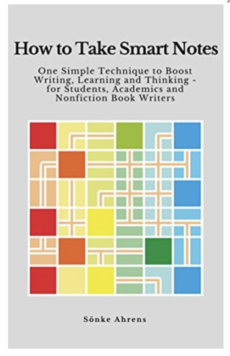💡 3-Sentence-Summary
How to Take Smart Notes is an actionable, well-research how-to guide on improving your writing, reading, learning, note-taking, and knowledge management. Sönke Ahrens has spent years exploring the Zettelkasten (slip-box method). This book is the best English literature on the topic and explores fleeting notes, literature notes, and permanent notes in depth.
💭 What I think about it
Because of its applicability, this is my favorite book on note-taking. You’ll not only understand how note-taking works as a learning tool, but also get actionable insights on how to implement this into your life. The book is like “Make it Stick” applied to note-taking.
🌟 Who benefits from reading this book?
This book is for anyone who wants to level up their personal knowledge management.
📚 How the book changed my life
These are several ways this book (in combination with setting up a Digital Zettelkasten in RoamReseach) has transformed my thinking, learning, and writing. I wrote an entire article about this here.
- Increased productivity. I write and create faster. Instead of using my brain to browse through books and digital bookmark notes, I have everything in one place. A research-based 1,300-word article used to take me three hours to write— with Zettelkasten, it takes me one and a half.
- Original ideas. Whenever I write or research a topic, I browse through my Roamkasten and find what I’m looking for, plus connections between domains I hadn’t thought about in the first place.
- Better thinking. New information challenges my thinking and helps me overcome cognitive biases. I gain a deeper understanding of everything I read.
✍️ My Favorite Quotes
- Every intellectual endeavour starts with a note.
- To seek as many opportunities to learn as possible is the most reliable long-term growth strategy.
- A good workflow can easily turn into a virtuous circle, where the positive experience motivates us to take on the next task with ease, which helps us to get better at what we are doing, which n return makes it more likely for us to enjoy the work, and so on.
- Not learning from what we read because we don’t take the time to elaborate on it is the real waste of time.
- Notes are only as valuable as the note and reference networks they are embedded in.
- We learn something not only when we connect it to prior knowledge and try to understand its broader implications (elaboration), but also when we try to retrieve it at different times (spacing) in different contexts (variation), ideally with the help of chance (contextual interference) and with a deliberate effort (retrieval)
- If we accompany every step of our work with the question, “What is interesting about this?” and everything we read with the question, “What is so relevant about this that it is worth noting down?” we do not just choose information according to our interest
